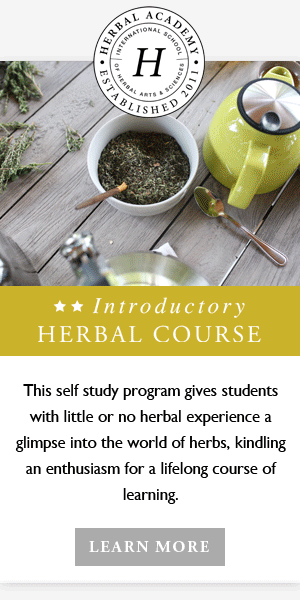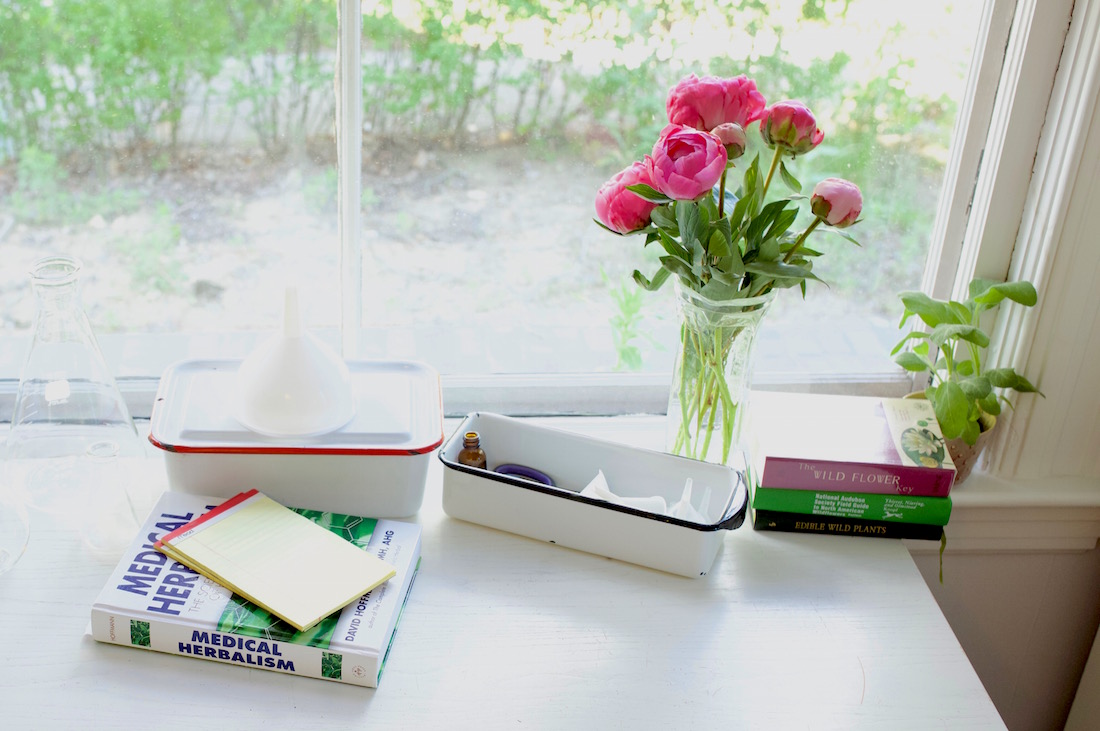
101 Herbal Books To Build Your Herbal Library
As we so often remind our readers and students, learning herbalism is a lifelong journey to be savored and experienced. It is an endeavor to be nurtured with hands-on practice, study with experienced teachers, and learning from the many herbal books written by herbalists of all traditions and approaches, both modern and historical.
As herbalists, our libraries are treasured collections of the books that have helped lead us along the learning journey. The books that continue to line our shelves are the ones that resonated with us most strongly and clearly at some point during our education. Some of these we return to frequently; others played a role in building our herbal foundation and hold fond memories. All have offered valuable information and insight to us.
Curating your herbal library doesn’t happen instantly, nor does it happen without expense. It’s a process of selecting those books that are right for your current learning needs or desires and making room in your budget to purchase them (the library is a good option, too!).
To give you suggestions, we have compiled 101 herbal books on our shelves that have contributed to our education and career development. These are written by many beloved herbalists who have helped shape the landscape of modern herbalism (and some historical herbalists, too).
In an effort to help you determine which books are right for you, they are grouped by topic and by difficulty—(B) for beginner, (I) for Intermediate, and (A) for Advanced levels. Keep in mind that these are just suggestions to note who might benefit most from a particular book, not a hard-and-fast rule! Many books may be suitable for a variety of levels, from the beginning student learning new concepts to the advanced practitioner seeking reference, and we may also take away different things from a book at different points in our education and career.
Enjoy perusing this list and making note of which titles might be a fit for you!
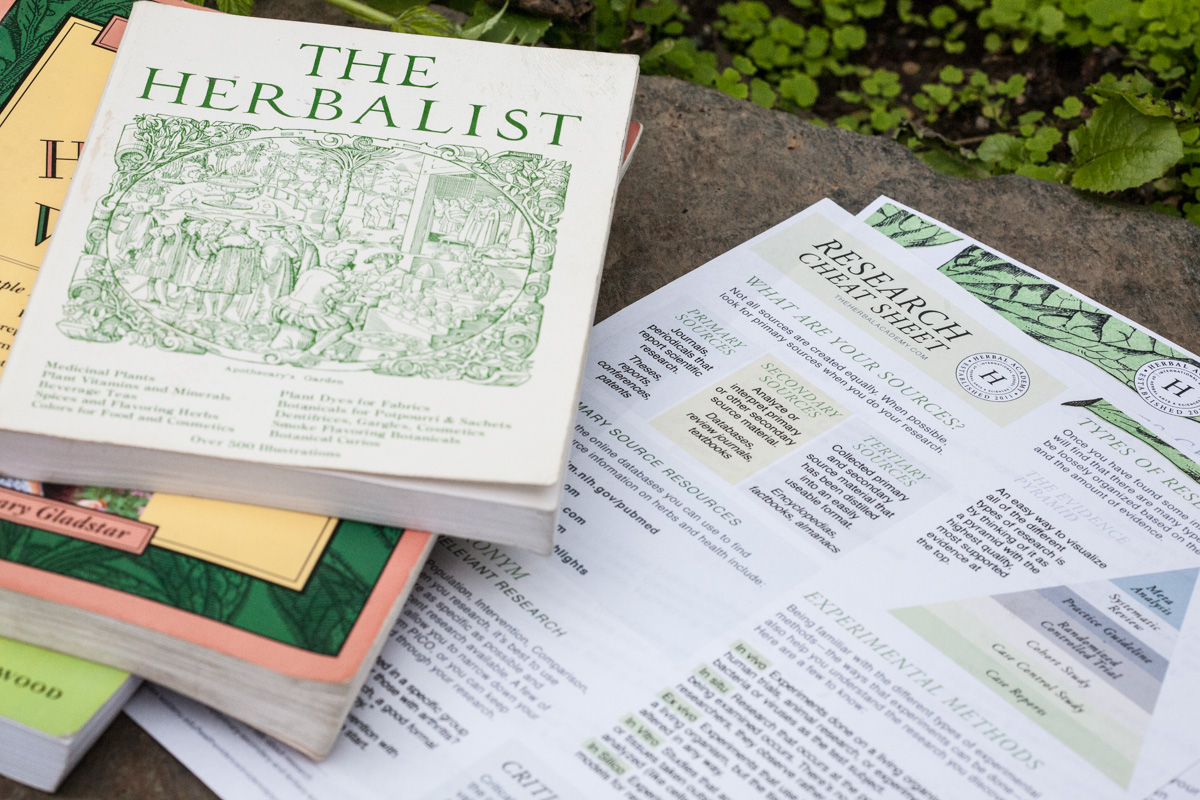
Introductory Herbals
1. Backyard Medicine: Harvest and Make Your Own Herbal Remedies by Julie Bruton Seal and Matthew Seal (B) – Profiles 50 common herbs and offers numerous recipes for herbal remedies.
2. Body Into Balance by Maria Noel Groves (B) – Covers the foundations of good health, a review of body systems, chapters on managing pain, longevity and vitality, herbal medicine for children and pets, monographs, recipes, and key recommendations.
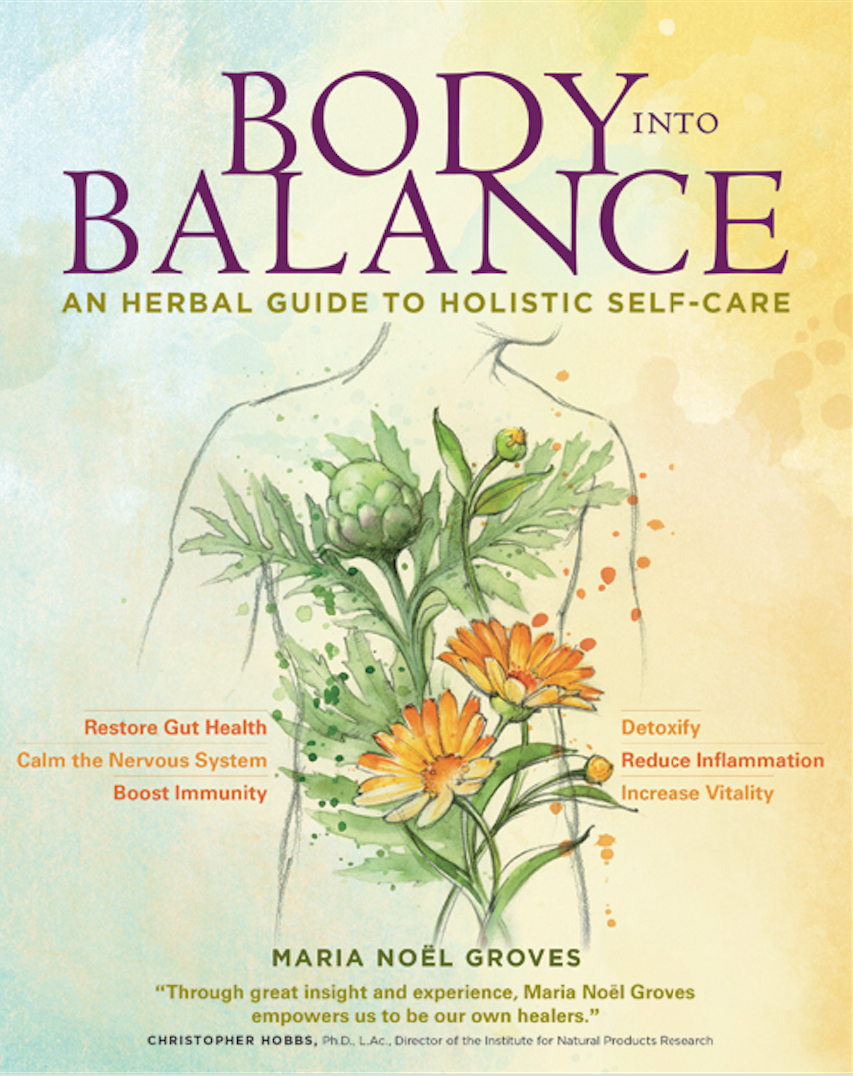
Body Into Balance by Herbal Academy Teacher Maria Noel Groves
3. Common Herbs for Natural Health by Juliette de Bairacli Levy – An insightful and practical book from a grandmother of the herbalism revival in the United States, who shares her deep knowledge of herbs and herbal remedies gained through hands-on study with traditional cultures.
4. Complete Earth Medicine Handbook by Susanne Fischer-Rizzi (B) – Describes 33 plants of Europe and North America from the traditional folkloric perspective, and includes recipes, lore, and practical uses for the plants.
5. Encyclopedia of Herbal Medicine by Andrew Chevallier (B) – Begins with an overview of herbal medicine and traditions and presents information on 550 plants, including habitat and cultivation, parts used, active constituents, therapeutic properties, uses, and preparations.
6. Flower Power by Anne McIntyre (B) – A beautiful, insightful, and well-written book that profiles numerous flowers, covering their usage in historical traditions as well as their usage as herbal remedies, aromatherapy oils, homeopathic remedies, and flower essences in the contemporary tradition.
7. Healing Wise by Susun Weed (B) – A classic herbal book that sets forth the foundations of the Wise Woman tradition and uniquely describes the personalities and uses of seven nourishing herbs.
8. Healing with the Herbs of Life by Lesley Tierra (B) – A detailed yet approachable book on Traditional Chinese Medicine (TCM) that covers fundamentals, TCM perspective on disease and healing, and a detailed materia medica.
9. Herbal Renaissance by Steven Foster (B) – Profiles clearly and in detail the botany, cultivation, harvest guidelines, historical and modern uses, and clinical research of numerous herbs.
10. Holistic Herbal 4th Edition: A Safe and Practical Guide to Making and Using Herbal Remedies by David Hoffmann (B) – A comprehensive, beautifully illustrated guide to over 200 herbs covering harvesting, constituents, preparation, actions, uses, and dosage, as well as herbs for various common ailments.
11. Making Plant Medicine by Richo Cech (B) – A much-loved how-to guide to making herbal preparations that also includes plant profiles of 100 herbs that can be grown in North America.
12. Medicinal Herbs: A Beginner’s Guide: 33 Healing Herbs to Know, Grow, and Use by Rosemary Gladstar – A hands-on book for readers who want to make their own remedies, includes information on growing, harvesting, making herbal preparations, and using 33 common healing plants.
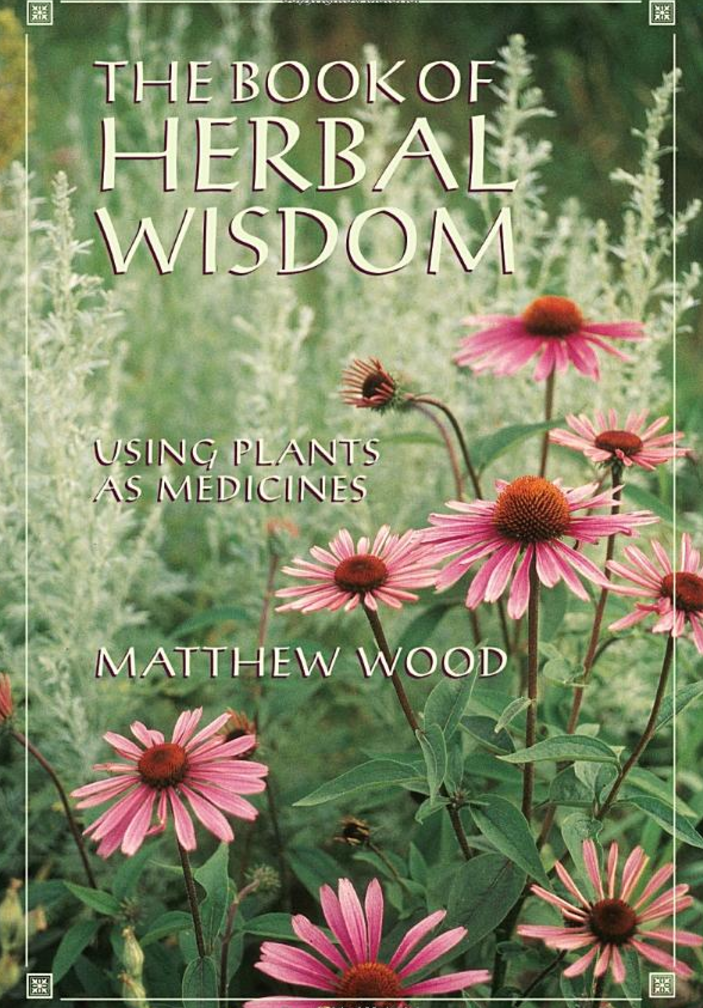
The Book of Herbal Wisdom by Herbal Academy Educator Matthew Wood
13. Opening Our Wild Hearts to the Healing Herbs by Gail Faith Edwards (B) – Lovely profiles of the cultivation, harvest, and uses of 113 herbs and trees written in the author’s warm, wise woman style.
14. Planting the Future: Saving our Medicinal Herbs edited by Rosemary Gladstar and Pamela Hirsch (B) – Multiple herbalist contributors celebrate at-risk wild plants and teach how to protect, cultivate, and use these important plants.
15. Practical Herbs by Henriette Kress (B) – This Finnish herbalist writes about 23 plants found in her home region (and throughout the world), how to cultivate and harvest them, and how to make herbal preparations.
16. Rosemary Gladstar’s Herbal Remedies for Vibrant Health by Rosemary Gladstar (B) – A comprehensive guide to herbs and recipes for supporting overall wellness and everyday ailments written by one of our most treasured American herbalists.
17. The Book of Herbal Wisdom: Using Plants as Medicine by Matthew Wood (B) – Integrates North American indigenous herbalism, Traditional Chinese Medicine, homeopathy, and Western herbalism to paint a picture of medicinal uses of more than forty plants.
18. The Desktop Guide to Herbal Medicine by Brigitte Mars (B) – Detailed monographs of 180 herbs, including actions in the body, constituents, energetics, common, historical, and modern uses, and contraindications.
19. The Gift of Healing Herbs by Robin Rose Bennett (B) – A wise and insightful book written from the author’s own perspective and experience, detailing the nature of each herb as well as their potential to support our wellness, and illustrated with anecdotal case studies.
20. The Herbal Handbook: A User’s Guide to Medical Herbalism by David Hoffmann (B) – Covers the history and practice of various herbal traditions, herbal actions illustrated by applicable herbs, how to use herbs for various body systems/ailments, and how to grow herbs and use them for remedies, cooking, and dyes.
21. The Herbal Kitchen by Kami McBride (B) – Chock full of simple and creative ways to use herbs in the kitchen, complete with numerous recipes and detailed profiles of how many common cooking herbs and spices are useful for health.
22. The Herbal Medicine Maker’s Handbook: A Home Manual by James Green (B) – Authoritative yet lighthearted guide to making all kinds of herbal preparations, complete with detailed step-by-step instructions and the why and how to help it all make sense.
23. The Way of Herbs by Michael Tierra (I) – Integrates Western and Eastern perspectives to present the wider holistic approach of herbalism and profiles the botanical and therapeutic properties of 140 Western herbs and 31 Chinese herbs.
24. The Wild Wisdom of Weeds: 13 Essential Plants for Human Survival by Katrina Blair (B) – Profiles 13 wild plants “essential for human survival” that grow along with human civilization across the globe; profiles include photographs, botany, habitat, history, edible uses, medical actions, medicinal uses, and recipes.

Traditional and Folk Herbalism
25. The Earthwise Herbal: Complete Guide to New World Plants and The Earthwise Herbal: Complete Guide to Old World Plants by Matthew Wood (I) – These two volumes focused on western herbalism and a folk-style approach encompass a thorough materia medica, including historical use, Wood’s personal experiences working with the herbs in his clinical practice, and plant energetics.
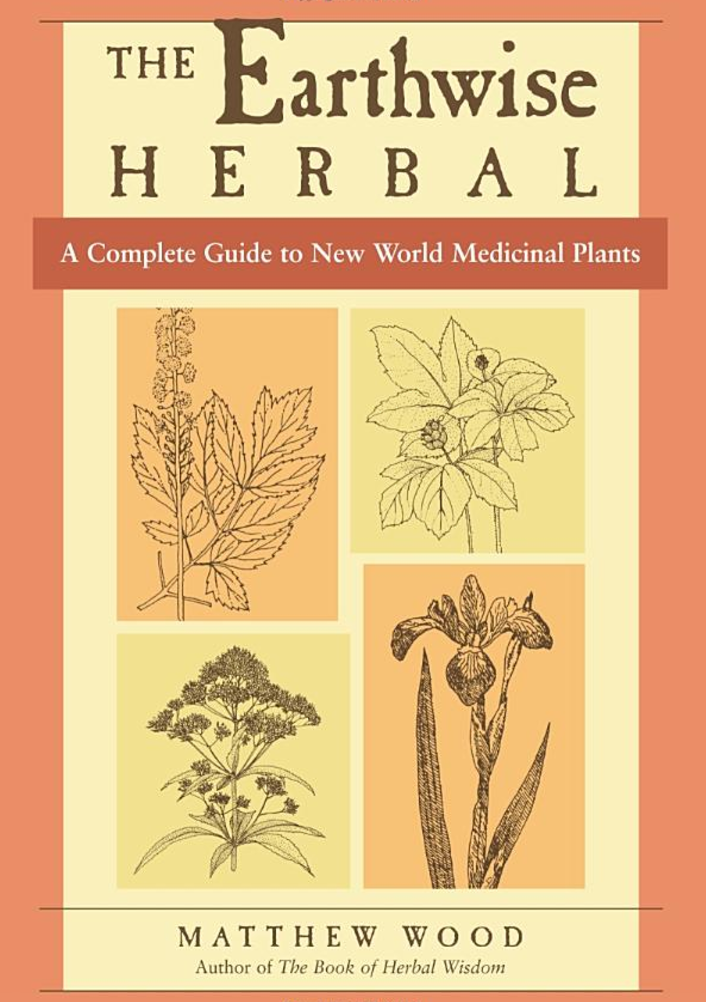
The Earthwise Herbal by Herbal Academy teacher Matthew Wood
26. The Plant Healer’s Path: A Grassroots Guide For the Folk Herbal Tribe by Jesse Hardin (I) – A collaborative work from several modern herbalists that explores modern folk herbalism and guides (and inspires) readers to reflect and find their individual herbalist voices to add to the collective.
27. The Practice of Traditional Western Herbalism by Matthew Wood (I) – A study of the rich history and underlying framework of traditional Western herbalism stemming from an array of western traditions, including the language of “energetics”; includes both theory and fascinating plant profiles.
28. Traditions in Western Herbalism Essays And Class Notes: Essential Information & Skills by Jesse Hardin (I) – Offers the work of a bevy of respected modern herbalists culled from Plant Healer conferences, offered in four sections: Herbal Practice, Clinical Skills and Therapeutics, Herbs and Actions, and Food, Wildcrafting, Self-Care & Sense of Place.
Historical Texts
29. A Modern Herbal Vol. 1 and A Modern Herbal Vol. 2 by Maud Grieve (B) – Written in 1931 and a beloved classic, presents a fascinating look at herbalism that is a blend of earlier sources like Culpeper alongside the herbal folklore of the British Isles and modern (at the time) science and botany; includes an extensive A to Z compilation of plant profiles. Also available online at Botanical.com.
30. Culpeper’s Complete Herbal by Nicholas Culpeper (I) – Originally published in 1653 and still in print, details 411 herbs and their uses, remedies, and cautions from Culpeper’s blend of Greek medicine and astrological herbalism. Also available online at Archives.org.
31. Kings American Dispensatory by Harvey Felter and John Lloyd (I) – The extensive materia medica of the Eclectic physicians at the Eclectic Medical Institute, first published in 1854. Also available online at Henriette’s Herbal Homepage.
32. The American Materia Medica, Therapeutics and Pharmacognosy by Finley Ellingwood and John Uri Lloyd (I) – Published in 1919, an extensive materia medica arranged by ailments of the various body systems. Also available at Henriette’s Herbal Homepage.
33. The Eclectic Practice of Medicine by Finley Ellingwood (I) – Written in 1910, a comprehensive guide to herbal and other therapeutics for treatment of disease in the Eclectic tradition. Available online at Henriette’s Herbal Homepage.
Ayurveda
34. The Ayurveda Bible by Anne McIntyre (I) – Comprehensive exploration of the science of Ayurveda, its herbs, preparations, and formulas, and Ayurvedic diagnosis and treatment.
35. The Way of Ayurvedic Herbs: A Contemporary Introduction and Useful Manual for the World’s Oldest Healing System by Karta Purkh Singh Khalsa, Michael Tierra (I) – Extensive information on Ayurvedic healing and using Ayurvedic herbs to support wellness from two experienced practitioners.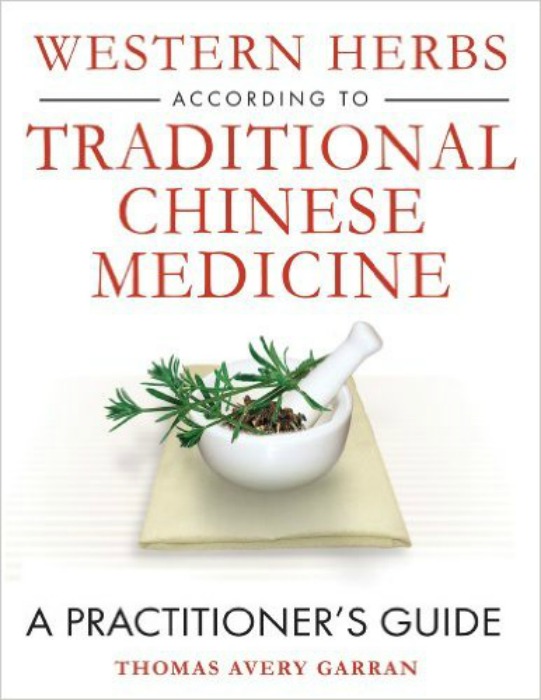
36. The Yoga of Herbs: An Ayurvedic Guide to Herbal Medicine by David Frawley and Vasant Lad (B) – A great introduction to Ayurvedic theory, materia medica, and herbal preparations and uses.
Traditional Chinese Medicine
37. The Energetics of Western Herbs: A Materia Medica Integrating Western and Chinese Herbal Therapeutics, vol. 1 (4th Rev. Ed.) and The Energetics of Western Herbs: Vol. 2 (4th Rev. Ed) by Peter Holmes (I) – Comprehensive look at holistic herbalism through the lenses of Chinese and Greek herbal medicine, vitalism, and modern science, with an emphasis on energetics; over 220 thorough and enlightening plant profiles.
38. The Way of Chinese Herbs by Michael Tierra (I) – Informative yet easy-to-follow, details the uses of herbs used in Traditional Chinese Medicine and how to integrate them into daily life, includes recipes and formulas.
39. The Web That Has No Weaver: Understanding Chinese Medicine by Ted J. Kaptchuk (I) – A good starting point for exploring the complex theories and practical framework of Traditional Chinese Medicine.
40. Western Herbs According to Traditional Chinese Medicine: A Practitioner’s Guide by Thomas Avery Garran (A) – An authoritative guide to using Western herbs in the TCM tradition; includes 58 plant monographs and describes how to use Western herbs in Chinese formulas.
Native American Herbalism
41. Native American Ethnobotany by Daniel E. Moerman (I) – A extensive and impressive work documenting the ways North American native people have used 4,000 plants for food, medicine, fiber, and dye. Also available as a searchable online database.
42. Native Plants, Native Healing: Traditional Muskogee Way by Tis Mal Crow (B) – Teaches how to identify, harvest, and prepare common plants of Eastern North America and how to use them for human ailments; emphasizes the importance of spirit and intent to honor the plants when wildcrafting.
43. Sacred Plant Medicine: The Wisdom in Native American Herbalism by Stephen Harrod Buhner (I) – Drawing from his own experiences as well as careful research, the author explores the ways spirituality and herbalism can overlap, and the sacred relationships indigenous people cultivate with plants.
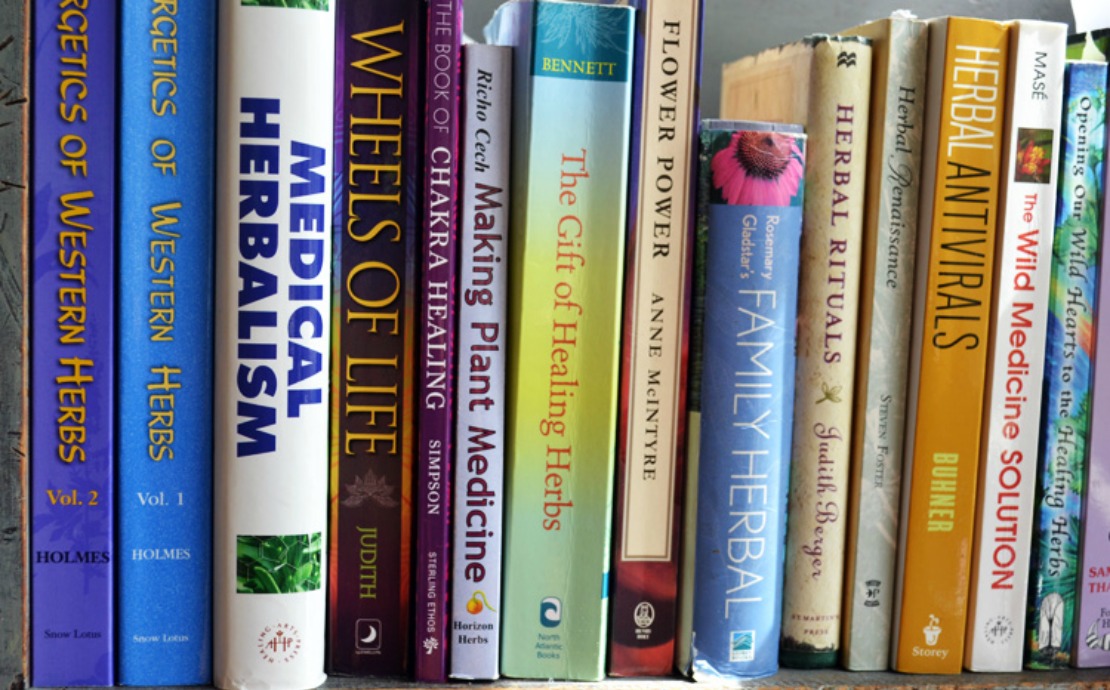
Plant Identification and Foraging
44. Botany in a Day by Thomas J. Elpel (B) – Teaches a novel way of identifying plants by observing their plant family patterns and characteristics, which often also give clues to their edible or medicinal usage.
45. Medicinal Plants of the Mountain West by Michael Moore (B) – Covers the medicinal herbs found in New Mexico, Arizona, west Texas, Nevada, Utah, Colorado, and California, more than 100 species; it is both an identification guide with information on harvesting and preparing herbs, and also a materia medica on the medicinal uses based on the author’s deep experience.
46. Medicinal Plants of the Pacific West by Michael Moore (B) – Covers 300 species of medicinal plants from Baja California to Alaska; an identification guide that also discusses harvesting and preparing herbs as well as extensive information on their medicinal uses.
47. Medicinal Plants of the Desert and Canyon West (B) by Michael Moore – Covers more than 100 species of medicinal plants of rock and arid lands of the Western uplands; an identification guide that also discusses harvesting and preparing herbs as well as well as extensive information on their medicinal uses.
48. Nature’s Garden by Samuel Thayer (B) – Details 41 common North American edible plants, from identification and harvest to preparation and use.
49. Newcomb’s Wildflower Guide by Lawrence Newcomb (B) – Learn to identify flowering plants of the northeastern 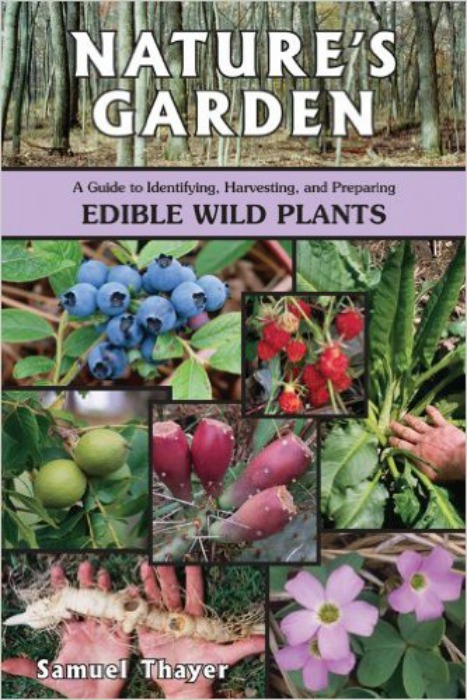 United States using the key system to answer questions about shape and structure of the plant parts.
United States using the key system to answer questions about shape and structure of the plant parts.
50. Peterson’s Field Guide: Eastern/Central Medicinal Plants and Herbs by Steven Foster and James A. Duke (B) – Geared toward the eastern and central United States and Canada; plant photos organized by color; text outlines plant traits, habitat, uses, and warnings for more than 530 important medicinal plants.
51. Peterson’s Field Guide: Western Medicinal Plants and Herbs by Christopher Hobbs, Steven Foster, Roger Tory Peterson (B) – Geared toward the western North America; plant photos organized by color; text outlines plant traits, habitat, uses, and warnings for more than 530 important medicinal plants.
52. The Forager’s Harvest by Samuel Thayer (B) – Details 32 more common North American edible plants, from identification and harvest to preparation and use.
Medicinal Mushrooms
53. Medicinal Mushrooms: An Exploration of Tradition, Healing, & Culture (Herbs and Health Series) by Christopher Hobbs (B) – Describes the use of fungi for food and wellness in Eastern and Western cultures and details the benefits of more than 100 species of edible fungi.
54. Mycelium Running by Paul Stamets (B) – a fascinating and comprehensive look at mushrooms role in a healthy ecosystem and how they can (and do) support the wellness of the planet; includes medicinal and nutritional information as well as growing methods.
Cultivating Herbs
55. Homegrown Herbs: A Complete Guide to Growing, Using, and Enjoying More Than 100 Herbs by Tammi Hartung (B) – A beautiful book that profiles 101 herbs, describing their habitats, tips for propagation, cultivation and harvesting, and culinary a medicinal uses; and covers garden design, soil building, gardening, making herbal preparations, and cooking with herbs.
56. The Medicinal Herb Grower by Richo Cech (B) – A guide to growing medicinal herbs organically, written in the author’s amusign and anecdotal style, covers growing and processing herbs for seed and for medicinal herbs.
57. The Organic Medicinal Herb Farmer by Jeff Carpenter and Melanie Carpenter (B) – The owners of Zack Woods Herb Farm in Vermont share a vast amount of practical information covering all aspects of propagating, growing, harvesting, drying, marketing, and selling medicinal herbs (and includes detailed plant profiles for 50 herbs), as well as how to manage the business side of things.
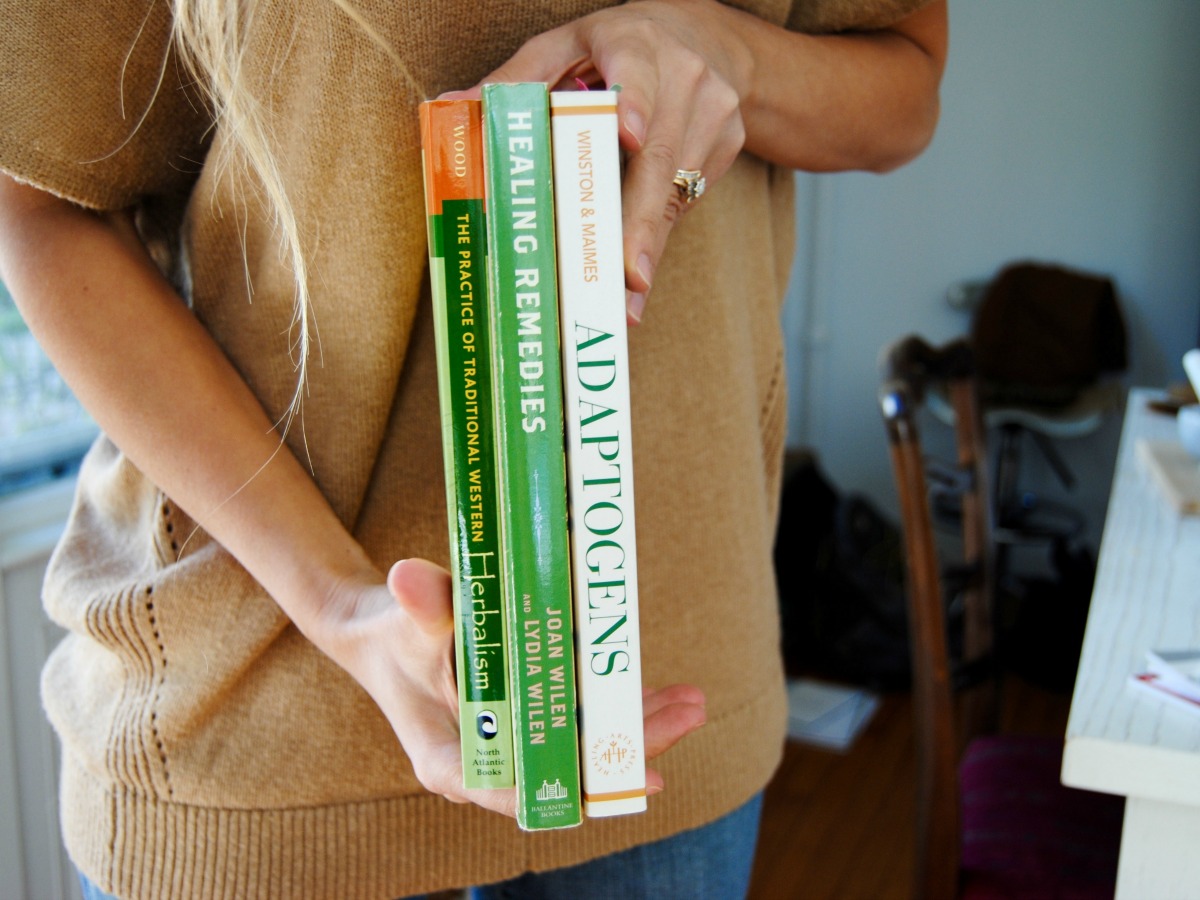
Specific Herbal Topics
58. Adaptogens: Herbs for Strength, Stamina, and Stress Relief by David Winston and Steven Maimes (I) – A fantastic, well-researched book that describes adaptogenic herbs, their use in various herbal traditions, and their actions and role in supporting the human stress response and wellness; detailed monographs for 21 adaptogens and 19 nervine and nootropic herbs that complement adaptogens include uses, actions, preparation, and dosage information.
59. Adaptogens in Medical Herbalism by Donnie Yance (A) – Explores the author’s holistic approach for using adaptogens to support the body’s energy levels and response to stress and as a tonic to support the body’s wellness, includes 60 herbal monographs and custom formulations.
60. Herbal Antibiotics by Stephen Harrod Buhner (I) – A well-researched guide to using herbal antibiotics to build immunity and protect against bacterial infections; includes detailed plant monographs and wellness protocols.
61. Herbal Antivirals by Stephen Harrod Buhner (I) – A well-researched guide to using herbal antivirals to build immunity and protect against viral infections; includes detailed plant monographs, herbal preparations, and wellness protocols.
62. Nutritional Herbology by Mark Pedersen (I) – Describes the minerals and nutrients in herbs and presents in herbal monographs the nutritional profile, folk history and use, medicinal properties, and usage information for numerous herbs; then delves into herbs for addressing deficiency and excess in the various body systems.
63. The Wild Medicine Solution by Guido Masé (I) – With deft clarity, combines concepts from traditional herbalism with history and mythology, modern herbal practice, and modern scientific research to describe how aromatic, bitter, and tonic herbs are uniquely suited to support our physiological wellness; includes recipes.
64. Winston & Kuhn’s Herbal Therapy and Supplements by Merrily Kuhn & David Winston (I) – Combines traditional herbalism and modern science to present traditional and modern use, botanical descriptions, constituents, recommended usage, side effects, and safety for 115 herbs.
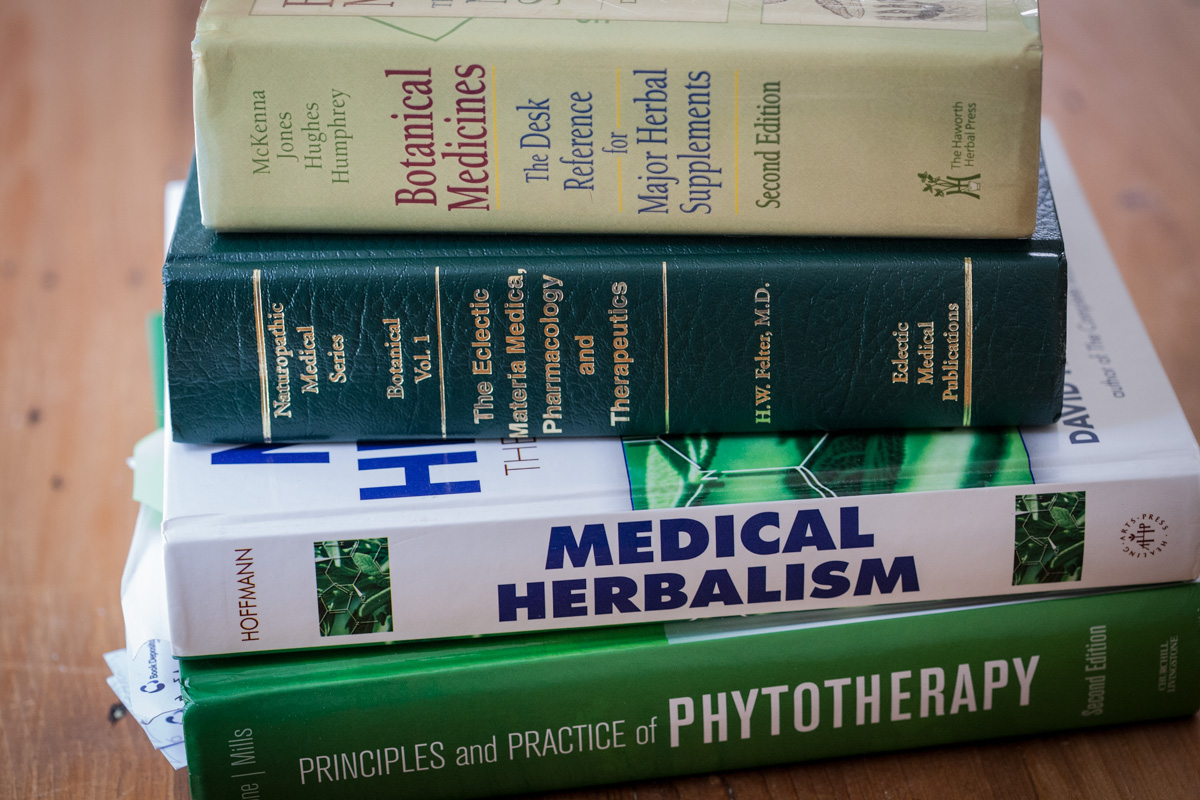
Dietary Therapeutics
65. Food as Medicine: The Theory and Practice of Food by Todd Caldecott (B) – Using the theories of Ayurveda and modern science, offers practical nutritional guidance (and recipes) to support individual wellness.
66. The Healing Power of Minerals, Special Nutrients and Trace Elements by Paul Bergner (B) – A great read on the role of minerals and trace elements in our wellness, their dwindling availability in our modern food supply, and how to replenish them in your diet.
Women’s Health
67. Breast Cancer? Breast Health! The Wise Woman Way by Susun Weed (B) – Offers information in the wise  woman tradition for maintaining breast health or for supporting the body after a breast cancer diagnosis, including herbal and dietary therapeutics and lifestyle suggestions.
woman tradition for maintaining breast health or for supporting the body after a breast cancer diagnosis, including herbal and dietary therapeutics and lifestyle suggestions.
68. Down There: Sexual and Reproductive Health by Susun Weed (B) – Walks through the reproductive body parts (both female and male) and describes their healthy states and common imbalances, then makes herbal, alternative, and allopathic therapy suggestions based on six steps of healing: do nothing, collect information, engage the energy, nourish and tonify, stimulate/sedate; use drugs; break and enter.
69. Herbal Healing for Women by Rosemary Gladstar (B) – With home remedies for the common ailments women experience from adolescence through menopause, this health care manual empowers women to support their wellness with herbs; includes recipes and preparation instructions as well as an herbal materia medica.
70. Botanical Medicine for Women’s Health by Aviva Romm (I) – Dr. Romm and several other herbalist contributors integrate traditional herbalism and modern science to describe medical and herbal therapeutics in support of women’s health and common conditions; materia medica includes a plant’s clinical indications and recommendations for safe use.
71. New Menopausal Years: The Wise Woman Way by Susun Weed (B) – Supporting a woman through menopause the wise woman way; organized by the six steps of healing mentioned above, offers herbal solutions for a multitude of symptoms and conditions that accompany menopause.
72. The Complete Woman’s Herbal by Anne McIntyre (I) – A thorough reference book of simple and effective herbal remedies for health conditions and symptoms faced by women from puberty through menopause and elder years; beautiful plant profiles discuss history, energetics, chemistry, and uses to give a thorough picture of the plant.
73. The Natural Pregnancy Book by Aviva Jill Romm (B) – A comprehensive guide to pregnancy, the ailments a women may encounter, and dietary suggestions and herbal therapeutics to promote wellness and ease the journey.
74. Wise Woman Herbal for the Childbearing Year by Susun Weed (B) – In the wise woman tradition, shares simple and safe herbal support prior to and during pregnancy to ease symptoms and promote health of mother and baby.
75. Women, Hormones, & the Menstrual Cycle by Ruth Trickey (A) – Discusses common conditions and complex disorders women face from puberty through menopause and dives into the endocrine system and hormonal replacement therapy; offers information on allopathic treatments as well as dietary and herbal therapeutics; includes a materia medica organized by herbal actions.
Men’s Health
76. The Male Herbal by James Green (I) – A guide to herbal support for both preventative wellness and common conditions boys and men may face in terms of their physical and emotional health; includes numerous herbs and remedies and how to choose the appropriate herb based on a new constitutional model.
Children’s Health
77. Herbal Healing for Children by Demetria Clark (B) – A practical guide, this book gives parents an introduction to herbalism and teaches them how to make simple herbal remedies for common childhood conditions.
78. Naturally Healthy Babies and Children by Aviva Jill Romm (B) – Offers easy-to-understand herbal and dietary  recommendations for the common health conditions and symptoms children face as babies through pre-adolescence.
recommendations for the common health conditions and symptoms children face as babies through pre-adolescence.
79. Herbs for Children’s Health by Rosemary Gladstar (B) – This beloved herbalist shares recipes and instructions for making herbal remedies for common childhood ailments, offers clear dosing guidelines, and profiles 24 herbs especially suited for children.
Advanced Herbalism and Practice
80. A Clinical Guide to Blending Liquid Herbs by Kerry Bone (A) – Explores the art and science of making and herbal extracts and formulating blends to help an advanced practitioner or an herbal entrepreneur interested in manufacturing products to take their art to a new level.
81. Aromatherapy for Health Professionals, 4e by Shirley Price (A) – A solid textbook for the herbalist interested in essential oils that takes a practical and studied look at essential oil science and the foundations and context of safe use.
82. Clinical Botanical Medicine by Eric Yarnell, Kathy Abascal, and Carol Hooper (A) – Geared toward the clinician, discusses the use of botanicals for a long list of diseases and conditions, and includes information on safety, potential toxicity, and herb-drug interactions.
83. Clinical Naturopathic Medicine by Leah Hechtman (A) – Geared toward the clinician, takes a comprehensive look at conditions affecting body systems and the herbal, dietary, and lifestyle therapeutics that can be used to resolve them.
84. Fundamentals of Pharmacognosy and Phytotherapy, 2e by Michael Heinrich (A) – Explores the chemistry involved in the interaction between herbs and the human body; covers basic basic plant biology, pharmaceuticals and nutraceuticals derived from plants, natural product chemistry, and herbs that are important in modern herbalism and phytotherapy.
85. Herbal Constituents: Foundations of Phytochemistryby Lisa Ganora (A) – This herbal textbook explores the chemistry behind how medicinal plants work in the body, yet is written with a holistic perspective by the author equally adept with traditional herbalism and chemistry.
86. Herbal Medicine from the Heart of the Earth by Sharol Tilgner (I) – A resource for the herbal practitioner that includes profiles of 192 herbs with dosage and safety information and herbal formulations for each body system.
87. Herbs and Natural Supplements: An Evidence-Based Guide, vol. 1 and 2, by Lesley Braun and Marc Cohen (A) – This set provides foundational knowledge for safe clinical practice and evidence-based monographs detailing modern, science-based uses and safety information for 132 herbs and supplements.
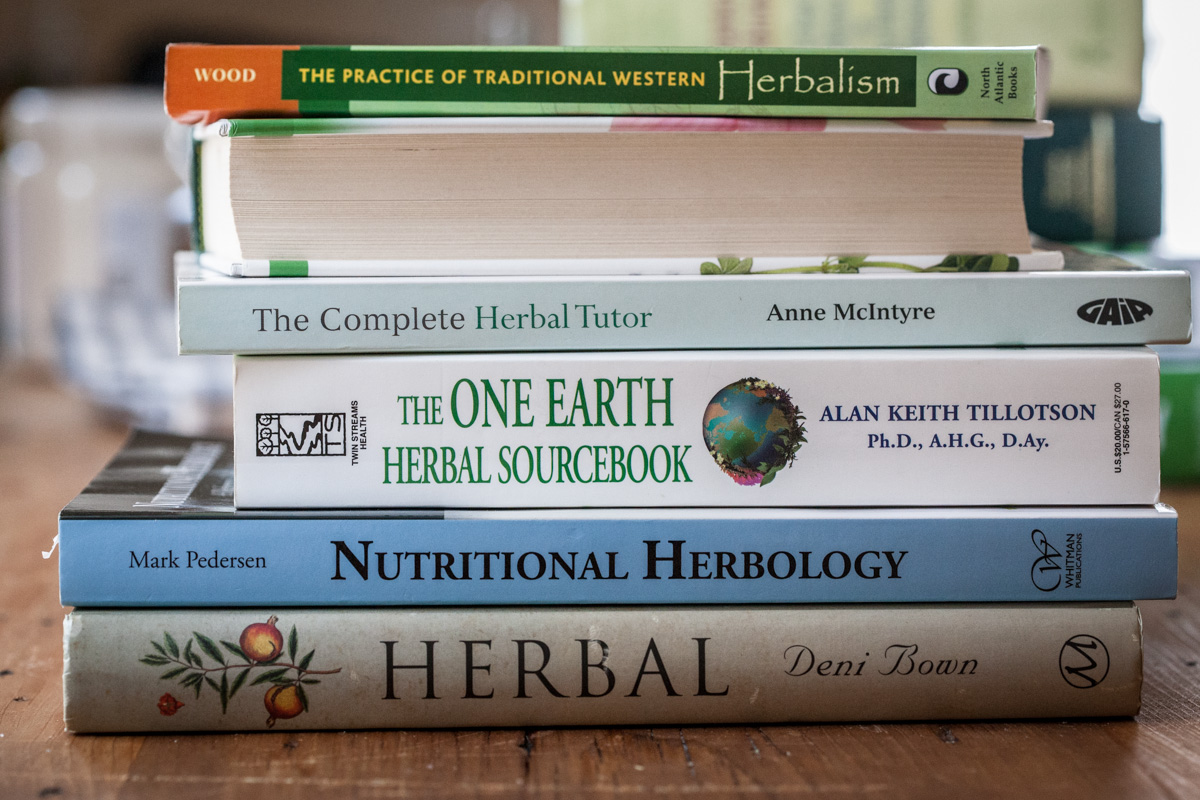
88. Medical Herbalism: The Science and Practice of Herbal Medicine by David Hoffmann (I) – Great resource for those interested in learning the science of herbalism, explains the different types of chemical compounds and goes into great detail with pharmacology, toxicity, and safety issues, formulation, treatment approach by body systems and an extensive materia medica.
89. Planetary Herbology by Michael Tierra (I) – Explores Ayurveda, Traditional Chinese Medicine, and Western Herbalism and integrates them for a practical holistic approach to wellness; includes profiles of 400 Western medicinal herbs.
90. Principles and Practice of Phytotherapy, 2nd ed by Kerry Bones and Simon Mills (A) – Another comprehensive work that explores the fundamentals of herbal medicine, offers practical clinical guides for the safe and effective use of herbs for various conditions and body systems, and includes 50 detailed plant monographs.
91. Textbook of Natural Medicine by Joseph Pizzorno and Michael T. Murray (A) – Geared for the clinician, discusses both natural and western medical intervention, profiles the pharmacology of 80 herbs and natural agents as well as herb-drug interactions, discusses numerous diseases and conditions and their pathophysiology and therapeutic rationale.
92. The Earthwise Herbal Repertory: The Definitive Practitioner’s Guide by Matthew Wood and David Ryan (A) – 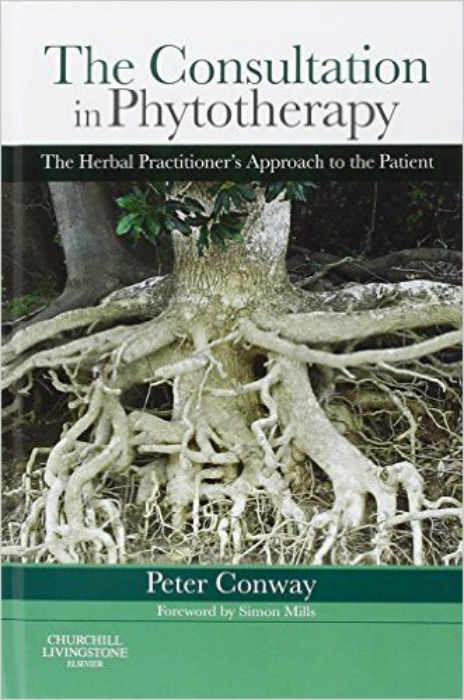 Takes a holistic approach to determining the appropriate herbal remedy for a particular person and condition by considering personal constitution, energetics, and symptoms and cross-referencing that with characteristics of herbs; as with Wood’s other books, this book is rooted in knowledge from multiple traditional herbalism systems.
Takes a holistic approach to determining the appropriate herbal remedy for a particular person and condition by considering personal constitution, energetics, and symptoms and cross-referencing that with characteristics of herbs; as with Wood’s other books, this book is rooted in knowledge from multiple traditional herbalism systems.
93. The Herbalist’s Way: The Art and Practice of Healing with Plant Medicines by Nancy & Michael Phillips (I) – Informal but detailed exploration of the art of herbalism, how to become an herbalist, and why – from an overview of the many possibilities, to finding your niche, legal aspects, and more.
94. The Consultation in Phytotherapy by Peter Conway (A) – Written from a UK perspective so not entirely applicable to clinical practice in the US, but provides insightful information on effective herbal consultation and practice.
95. The One Earth Herbal Sourcebook: Everything You Need to Know About Chinese, Western and Ayurvedic Herbal Treatments by Alan Tillotson (I) – Within the framework of Western herbalism, Ayurveda, and Traditional Chinese Medicine, explores the body systems, details individual herbs, and discusses the use of herbs for various health conditions.
96. The Practicing Herbalist by Margi Flint (I) – The author and several clinical herbalist contributors provide guidance for listening to and observing a client, including reading the face, tongue, pulse, and body, as well as information on herbal and dietary therapeutics.
Safety and Herb-Drug Interactions
97. AHPA Botanical Safety Handbook by Zoe Gardner and Michael McGuffin (A) – Valuable reference for gaining insight into the potential contraindications and safety questions that may arise about particular herbs in a client’s specific situation; includes 500 herb profiles with safety summary, literature review, side effects, toxicology, and drug interactions.
98. Herbal Contraindications and Drug Interactions plus Herbal Adjuncts with Medicines by Francis Brinker (A) – Evidence-based review of known herb contraindications and herb-drug interactions.
99. Herb, Nutrient, and Drug Interactions by Mitchell Bebel Stargrove, Jonathan Treasure, Dwight L. McKee (A) – Evidence based information on interactions for common herbal, nutrient, and drug therapeutics.
100. Meyler’s Side Effects of Herbal Medicine by J.K. Aronson (A) – Textbook approach to the potential side effects and adverse reactions that can occur with herbs and with the combination of herbs and pharmaceuticals.
101. The Essential Guide to Herbal Safety by Simon Mills and Kerry Bone (A) – Evidence-based guide presenting safety information for 125 common herbs, including herb quality, herb-drug interactions, adverse reactions, toxicity, and allergic reactions.
Looking for more books to support your herbal studies? Our new Herbal Bookshelf can help! Search, preview, and purchase books that have been hand-picked by Herbal Academy educators with ease. What will you add to your herbal library next?
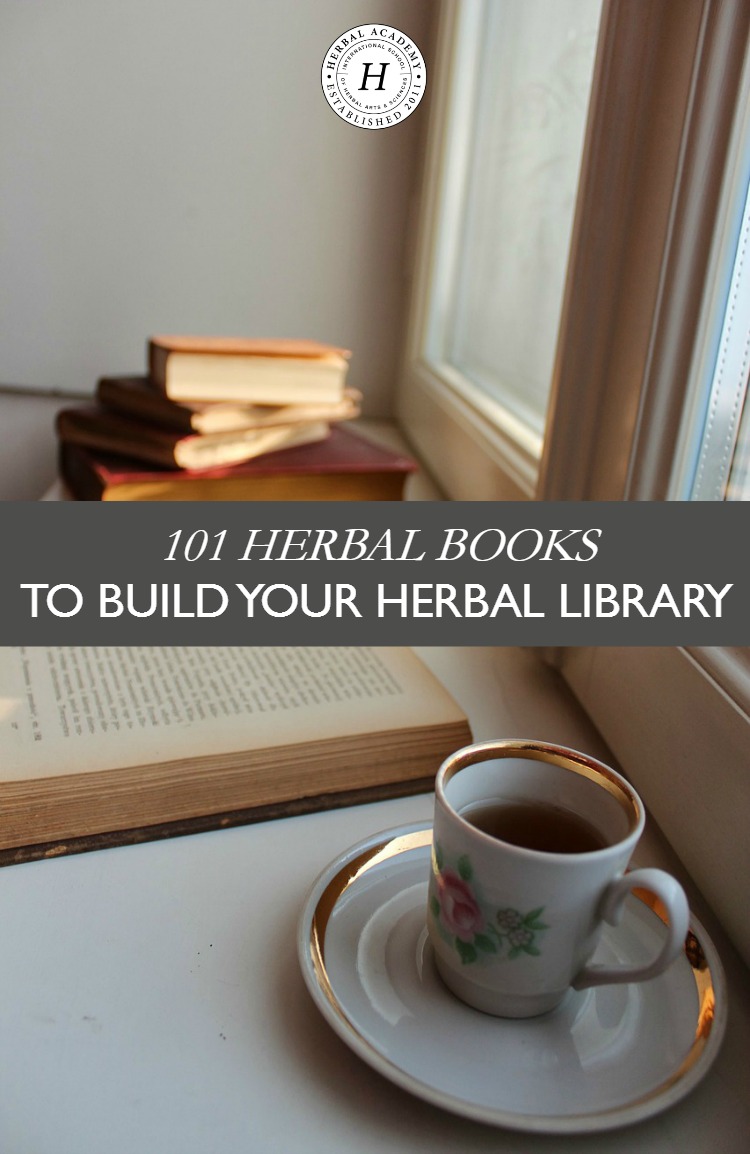
Books and resources listed in the Herbal Bookshelf, as well as in references, citations, and book reviews on the Herbal Academy website may contain titles and language that include words and phrases such as “healing,” “treat,” and “medicinal.” Herbal Academy web pages that include book reviews, products, references, citations, periodicals, or other publications and links should not be construed as medical claim, diagnosis, or treatment. The Herbal Academy is not responsible for the content of these outside resources. The Herbal Academy makes neither medical claim, nor intends to diagnose or treat medical conditions.

